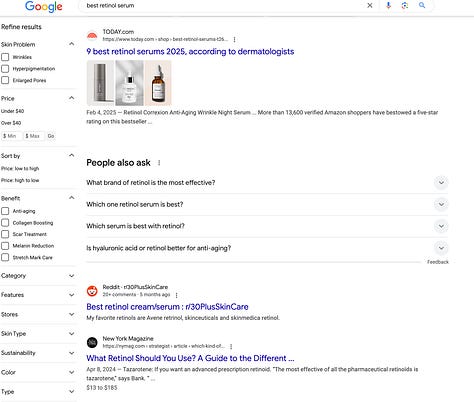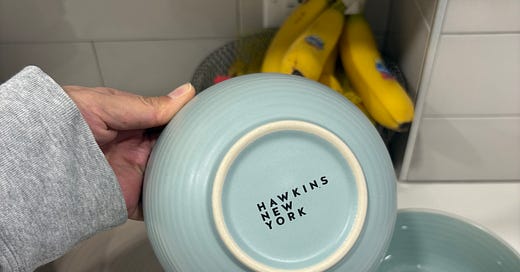If you’re new here, welcome to Delivered, a newsletter covering the intersection of content & commerce. If you haven’t already, subscribe to get all posts straight to your inbox.
Before I launched this newsletter, I made a list of topics that sat in the middle of a “content and commerce” Venn diagram—ideas for stories that weren’t solely about content or commerce, but rather how the two exist in relation to each other. I haven’t actually gotten around to many of the ideas on that list as more timely topics took my attention over the last few months (TikTok and social commerce), but over the next two newsletters, I plan to dive into one of those initial ideas, something I think about every time I Google literally anything: Reddit.
You should know that I’m a Reddit freak. I could tell you all the instances I’ve gone so deep into the Reddit rabbit hole that I’ve lost all sense of reality, but it wouldn’t be relevant to this professional newsletter. I understand Reddit and the value it brings to outlets trying to find new, engaged audiences. But as someone whose background is in writing, editing, and monetizing search-driven product recommendations via affiliate links, I can’t help but view Reddit as a threat to publishers whose core business is exactly that.
Over the course of the next two newsletters, I’ll unpack the Reddit question for affiliate publishers. Today, I’ll focus on what publishers can learn from Reddit and how they can incorporate those learnings into their on-platform content strategy. In the next newsletter, I’ll turn to strategies publishers can deploy on Reddit itself to bring their product recommendations to new audiences.
If you’re reading this and aren’t a subscriber, be sure to subscribe to get part two in your inbox.
Why do affiliate publishers even care about Reddit?
I’ll attempt to keep this relatively high-level, but the TL;DR is that Google has increasingly ranked Reddit and other forum content higher on its search engine result pages (SERPs), outranking sites that go to great lengths to show that their content incorporates the factors that Google has always signaled were important to achieving a high page rank: expertise, experience, authoritativeness, and trustworthiness, or E-E-A-T, in SEO parlance. Last April, an SEO expert called Google out on Twitter about it, and Google’s public search liaison responded, saying that because searchers were actively seeking out forum posts, for example, by adding “reddit” to the end of a query, Google simply decided to give them more of what they want. Some people in the search community also think that Google started favoring Reddit after the two companies signed a $60 million deal in February 2024 that gave Google access to Reddit content to train its AI models. Both can be true.
Anyway, back to the E-E-A-T thing. Affiliate commerce publishers that drive a lot of traffic from search are obsessed with signaling to Google that their sites embody E-E-A-T. And they’re right to be! It’s the set of standards Google has said it uses to rate page quality, and high page quality = high SERP ranking = more clicks to your website = more ad and affiliate revenue. It’s what justifies all the time and money publications pour into producing original product reviews.
A publisher’s competition for the top organic spots on Google used to be other publications and retailers, but now Reddit is a very real competitor. See, for example, screenshots of search terms for the best humidifiers, best espresso machines, and best retinol serums:



In a way, Reddit represents the antithesis of E-E-A-T. People who share their recommendations on a subReddit are totally anonymous strangers—you don’t know if they’re experts or how many humidifiers/espresso machines/retinol serums they’ve actually tried; the only thing you know is that they care enough to share their opinion. And yet, many of us click on those Reddit links and read through the reviews, suggesting that we trust them at least a little.
People want authentic product reviews, and Reddit delivers
The big question to me isn’t why Reddit is ranking high—I don’t doubt that many searchers seek out forum results—but why searchers seek those results in the first place. My hot take is that in so strictly adhering to E-E-A-T standards, publishers have made their product review content too clinical, and audiences have caught on and are tuning out. So many product recommendations follow the same format and lack voice—everyone has tested home appliances “for years” and uses the same adjectives to describe the winners—rendering so much search-driven content indistinguishable and inauthentic.
To be clear, I do think that people still value a rigorously tested product recommendation, but I also think they want more authenticity and the formulaic style detracts from a publisher’s perceived authority. When the Google rep explained why Reddit results were becoming more dominant in the article linked above, he wrote:
If [searchers are] looking for help, for example, about why their smart window blinds are disconnecting from an app, they may appreciate both what a manufacturer has to say, what some blogger that has reviewed them might say, as well as what people who have used them and shared on a forum have to say. That's a real example I did yesterday, and the forum results I got solved my issue quickly.
I think many people search for products in a similar way by seeking recommendations from at least two sources—at least I do. The first is the expert or tastemaker group, which includes both generalist sites (The Wirecutter, The Strategist, The Spruce, etc.) and more niche category publishers (Architectural Digest, Runner’s World, Babylist, etc). The defining feature of this group is that it has a financial incentive for readers to find and take action on its recommendations. The second source is what I call “real people,” or one’s peers. The members of this group aren’t sharing their recommendations on their own platform and/or with affiliate links, but in another site’s forum or comments section. These people are passionate, and almost always outliers in how much they love or hate the post’s topic.
When I search for a product, be it skincare or a small appliance, I do genuinely want to know what a publication that has done lots of research recommends. But I also want to know all the weird ways a serum or a humidifier works for someone’s specific situation, and that’s where Reddit delivers. I also want to compare what a financially-motivated publisher recommends versus an individual with no skin in the game.
What publications can learn from Reddit
I don’t think editors should abandon their SEO content strategies, even if their Google traffic has tanked. Unless they’re making up lost traffic elsewhere, views from search are still incredibly valuable. However, I do think they need to lighten up their tone and show some personality. Be more authentic! If a tester is reviewing a couch and her child threw up on it but the vomit washed right off, tell us! If a writer recommending moisturizers has dry skin, tell us how dry—is it like “a peeling sunburn 24/7” (how one Redditer describes her skin in this subReddit). Those are the personal details people go to Reddit for, don’t edit them out!
Another way publishers can bring more of that authentic Redditness to their own content is by trying out a discussion or roundtable format. Instead of interviewing one skincare obsessive on her favorite products, bring five obsessives together and get them talking. What are the products they love, the ones they think are overhyped, etc? Record them and post it on Instagram. Or just turn the transcript into an article. If you enable comments on your site, even better as readers can chime in. The goal is to make your content feel less directive and more participatory.
And finally, why not aggregate Reddit recommendations into an article? Remember when The Strategist used to publish round-ups of products “according to hyper-enthusiastic Amazon reviewers”? Who’s to say you can’t try a similar format with Reddit reviews? Link back to the subReddits you mention, and share it with the moderators. Maybe they’ll be annoyed, maybe not. The point is, don’t be afraid to experiment—it’s just shopping content.
Subscribe to get the next newsletter on how publishers can engage directly on Reddit in your inboxes.
Thanks for reading, here are a few industry headlines before you go:
Yahoo News launched a revenue share program with influencers where it’ll pay creators a share of advertising sales in exchange for posting content to its site. I’m curious what the terms are for creators—do they have obligations to drive their own audiences to Yahoo, or are they just incentivized by the revenue share and potential new followers? There’s definitely an idea here for affiliate publishers to think about as they compete with influencers for views and clicks. Something to explore in a future newsletter, perhaps! (Bloomberg)
Creators are suing Honey, Capital One Shopping, and other coupon browser extensions, saying the extensions take credit for purchases the creators drove by replacing the creators’ affiliate links with their own. The practice is called last-click attribution. It’s pretty standard for the affiliate industry and is always a hot topic in digital marketing. I guess creators are just catching on…? (The Wall Street Journal)
Not a headline but I’ve spent a fair amount of time on Flip since my last post. The content is absolute garbage, but I did garner enough rewards to buy dishware from Hawkins New York at a steep discount. I got two sets of bowls (this and this) for $41 total (they retail for a combined $112). Seems shady! Flip needs to get higher quality creators on its app before it runs out of money.
Thanks for reading. If you liked this newsletter, subscribe or forward to a friend. You can get in touch with me directly at elaheh.nozari@gmail.com.





